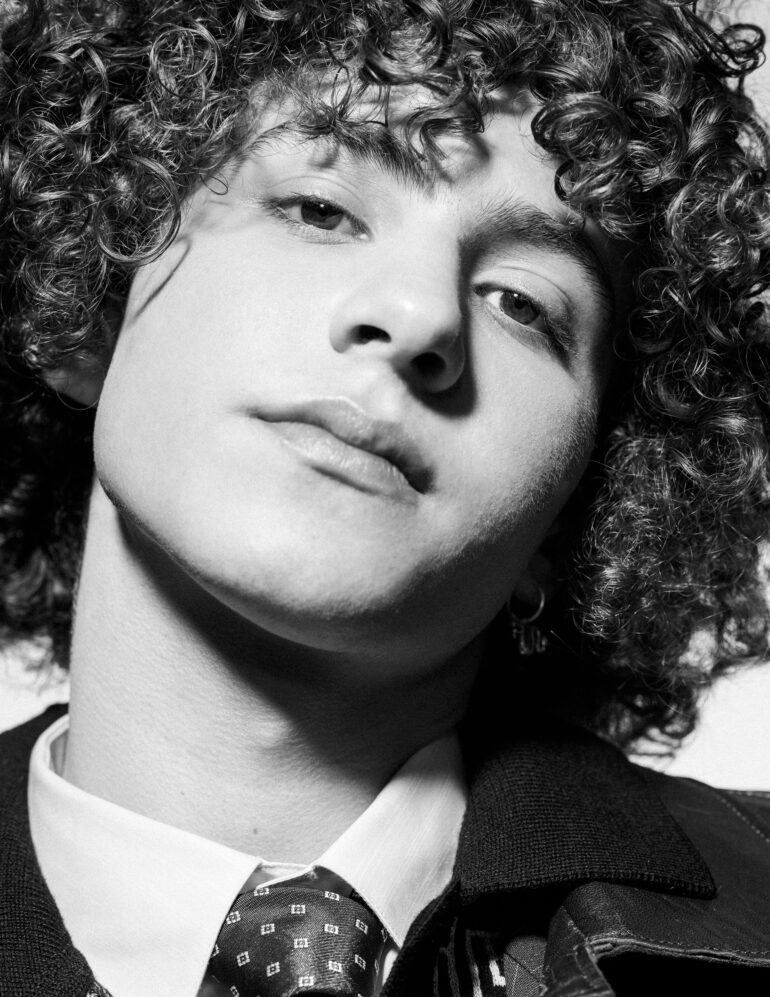The virtuoso Gaspar Varela
Words: Joana Moreira
Photo: Frederico Martins
He grew up in the fado houses and learned to play guitar precisely to accompany his great-grandmother, Celeste Rodrigues, “the best fadista in the world.” Gaspar Varela is 20 years old, his hair a mass of curls, his smile sweet. On a rainy afternoon, he sits in one of the few neighbourhood cafés still remaining in Lisbon. The setting is an apt one for a voyage to the past. “I was really young. I turned to gran and said: when I grow up, I’m going to learn to play for you. And she said, as a joke: by the time you grow up, I’ll be long gone. As if she’d already left. I said: don’t worry, I’ll wait for you.” Gaspar is proud to carry the family DNA, but not just for nostalgia’s sake. The last thing we do, when we see him and listen to him, isn’t a reliving of a certain past. Rather, we see the maturity of an heir to fado royalty who pays heed to his legacy, and for whom the future promises much.
He was seven when he climbed on stage for the first time. At Voz do Operário in Lisbon, Gaspar played Maria Teresa de Noronha’s Fado das Horas. Carried on the melodic wings of an instrument to which there is more than just fado, it wasn’t long before he became known as a wunderkind on the Portuguese guitar. He released a solo album, gave concerts, and definitely burst the Lisbon bubble in 2019 when Madonna invited him to join her on the Madame X world tour. For nine months, he travelled the globe. Most recently, he’s been accompanying singer Ana Moura live and is busy with the band he formed with his brother who is six years older, Sebastião, and a childhood friend, Rafael Matos. It’s called Expresso Transatlântico.
He and the café owner are on a first-name basis, and he’s told his brother had just swung by. He’s nothing if not laid back. “In fado, I was always treated differently. I’m lucky that way,” admits Gaspar, going on to stress that “I want people to know I’m Celeste’s great-grandson, but my art doesn’t end there with the fact Celeste is family. I had more opportunities on the back of it, I won’t deny. I wouldn’t say I pulled strings, but the fact Celeste Rodrigues was my great-grandmother… Obviously, whether we like it or not, certain doors open more easily. The trick is to know how to make the best of them.”
And Gaspar knew. He doesn’t underestimate the importance of the milieu he grew up in, a cultural melting pot where music was the main ingredient. “We don’t have a TV in the lounge, precisely to not get attached to it. The lounge is for us to enjoy each other’s company,” he makes clear. “In our house, music was always playing. Whether it was my father or mother, or my older brother, someone made sure music was always playing in the lounge.”
If at-home listening tastes were eclectic, a roll call of influences which would reveal themselves to be key to his musical upbringing, on the streets, fado was king. “I come from fado, and in fado the most important of all are the words. Even for whoever is playing, it’s the words that count. The way you feel the lyrics, the way you interpret them… there are things I feel in a certain way because it was fado that made me that way. It’s a very specific way of feeling.”
“I hope I can be sincere as an artist and as a person,” he says, with brutal honesty. As a creative force in his musical trio, Gaspar is influenced by the city he lives in. He calls them “the sounds of Lisbon”, which include the fado houses he still frequents even after the death of his great-grandmother in 2018. “I’m very grateful to fado. It was a wonderful schooling for me. I still play in them on occasion, and sit in the audience because that’s how we learn.” His respect for the past is in strict contrast to the eye-opening experience that yanked him away from the predictable future that awaited, as heir to classic fado. “The fact I went on tour with Madonna completely blew my mind,” he admits. “I was a slave to the Portuguese guitar scene. Halfway through the tour, I got the bug to begin exploring other directions, discover the new me, and show how Portuguese guitar can mix with different stuff,” he explains.
From Azul Celeste, to Alfama Texas or As Ladras, tracks from Expresso Transatlântico, Gaspar Varela will go on trying things out and finding his own path in music. “This is what I want to say, at this point, and want to talk about. This is me now, and this is where I’m heading,” he says. And what about fado? “Fado is a way of feeling too, you know? I might not be doing fado now, but I feel it.”



